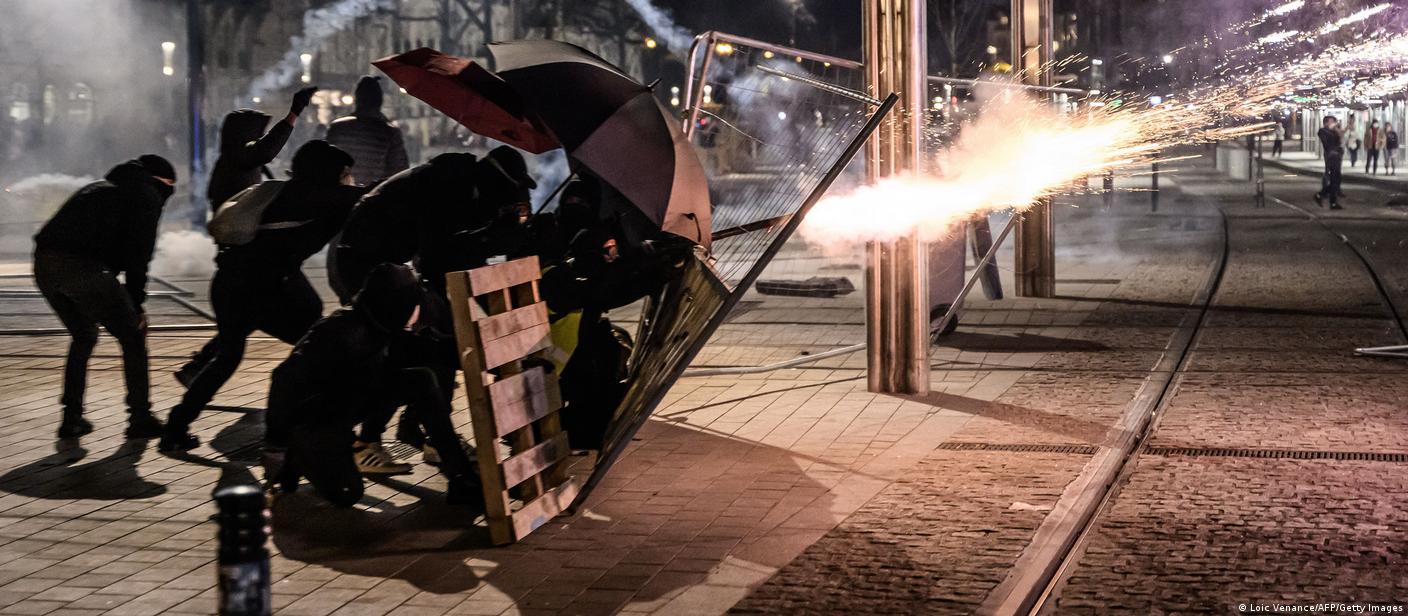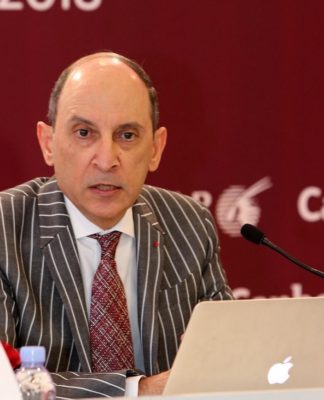POLITICSFRANCE
France: Pension protests, no-confidence motions after decree
60 minutes ago60 minutes ago
A day after President Emmanuel Macron forced the pension reform plan through parliament without a final vote in the lower house, the French opposition group tabled a motion of no-confidence against the government.
https://p.dw.com/p/4OqYr
Protests continued in Paris on Friday, a day after President Emmanuel Macron and his government decided to try to pass a contentious pension reform by decree, bypassing a vote in the lower house of parliament, the National Assembly.
Traffice, garbage collection and university campuses in Paris were disrupted, as unions threatened open-ended strikes in response to the pension decree.
CGT unionists march with flares and banners on the ring road as they block the traffic to protest, a day after the French government pushed a pensions reform through parliament without a vote, using the article 49,3 of the constitution, in Paris on March 17, 2023.CGT unionists march with flares and banners on the ring road as they block the traffic to protest, a day after the French government pushed a pensions reform through parliament without a vote, using the article 49,3 of the constitution, in Paris on March 17, 2023.
Union members carry a banner saying ‘not 67, not 64, retirement is at 60.’ In most of western Europe it is 65 or higher.Image: Bertrand Guay/AFP/Getty Images
Cars were torched in Paris and other French cities in the evening during demonstrations involving several thousand people, though police also said most of the demonstrators were peaceful.
Interior Minister Gerald Darmanin said some 310 people had been arrested by police and promised to crack down on troublemakers. “Opposition is legitimate, protests are legitimate but causing mayhem is not,” he told RTL radio.
Striking sanitation workers blocked a waste collection plant that is home to Europe’s largest incinerator to underline their determination, and university students walked out of lecture halls to join the strikes.
Leaders of the influential CGT union called on people to leave schools, factories, refineries and other work places. Several groups, including the yellow vest activists who had mounted formidable protests against Macron’s economic policies during his first term, called on the president’s opponents to march on the parliament at 18:00 (17:00 GMT) on Friday.
French protest against Macron’s pension reforms
01:46
What sparked the unrest?
The French government had decided on short notice on Thursday afternoon to bypass the National Assembly and implement President Emmanuel Macron’s most important reform project without a vote.
A special article in the French constitution allows for the bypass. Parliament still can overrule this, but only by arranging a no-confidence vote in the government within 24 hours of the decree.
The pension reform will, among other things, gradually increase the standard retirement age from 62 to 64. The government feared that the result in the lower house would be too close to predict.
Macron’s government argues the changes are necessary to keep one of western Europe’s most generous retirement systems solvent. He tried and failed to implement similar reforms in his first term, ultimately abandoning his flagship police amid the outbreak of COVID.
No-confidence motions in National Assembly
Meanwhile, French opposition lawmakers on Friday filed separate no-confidence motions against the government led by Prime Minister Elisabeth Borne after it imposed a contested pensions reform by decree, the leader of an independent parliamentary group said.
“The vote on this motion will allow us to get out on top of a deep political crisis,” said the head of the so-called Liot group Bertrand Pancher, whose motion was co-signed by members of the broad left-wing NUPES coalition.
The far-right National Rally (RN) filed a second motion, but that was expected to get less backing. RN lawmaker Laure Lavalette however said her party would vote for “all” no-confidence motions filed. “What counts is scuppering this unfair reform bill,” she said.
The National Assembly is expected to vote on the motions next Monday.
But even though Macron lost his absolute majority in the lower house of parliament in last year’s election, there was little chance either motion of no-confidence would pass — unless a surprise alliance is formed by MPs from all opposition quarters, incorporating France’s extreme left and extreme right, both powerful parliamentary factions.
The leaders of the conservative Les Republicains party have ruled out trying to topple the government; Macron had originally hoped to rely on their support to pass the reforms.
None of them had sponsored the first motion of no confidence filed on Friday. The far-right was expected to file another later in the day.
If an absolute majority of MPs vote in favor, the reform is defeated and the government must resign. Then President Emmanuel Macron could either try to appoint a new prime minister or call new elections. But if there is no absolute majority for a motion of no-confidence, the pension reform will be aproved.
The upper house, the Senate, had voted in favor of the reforms several times as France’s government tried to barter a bill through the legislature.
French government forces through pension reform
01:54
dh/msh (AFP, dpa, Reuters)






























